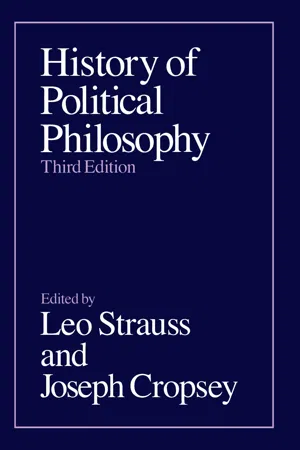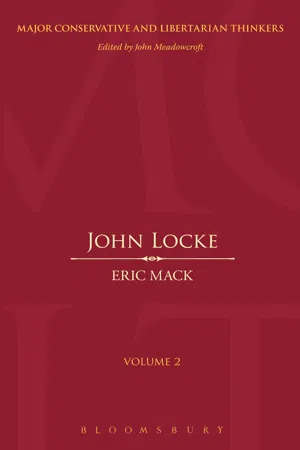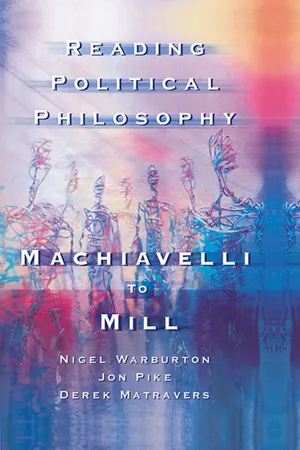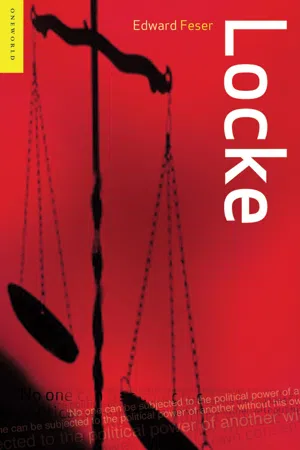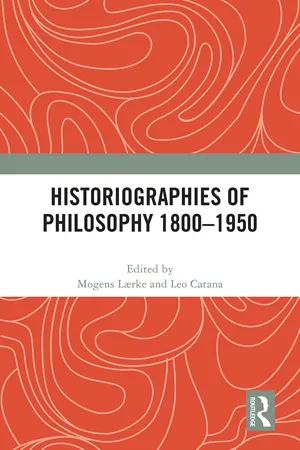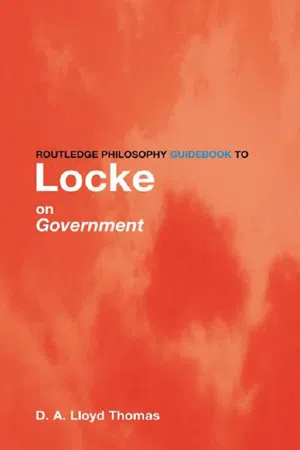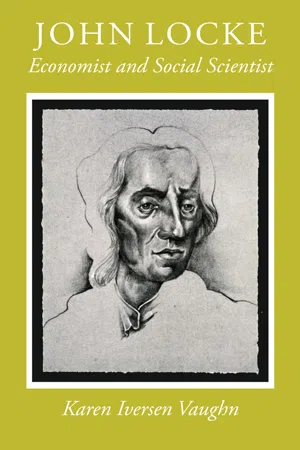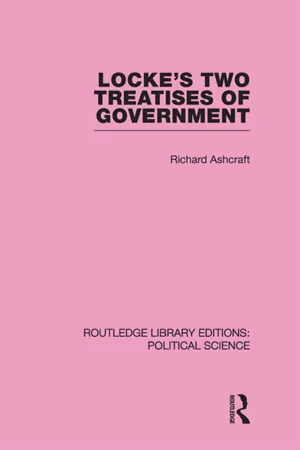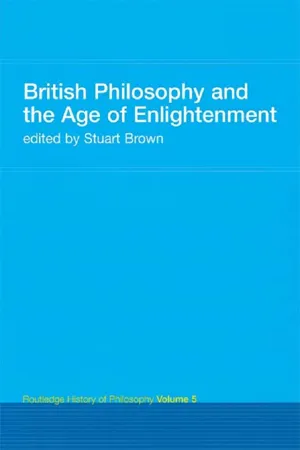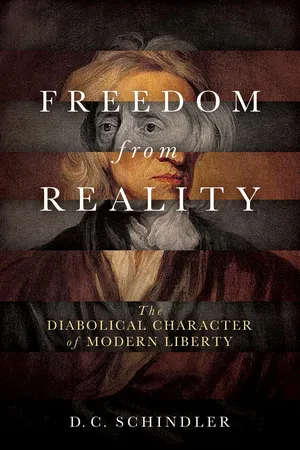Politics & International Relations
Two Treatises of Government
"Two Treatises of Government" is a seminal work by philosopher John Locke, advocating for the natural rights of individuals and the concept of a social contract between the government and the governed. The first treatise critiques the divine right of kings, while the second outlines the principles of a legitimate government based on consent and the protection of individual rights.
Written by Perlego with AI-assistance
Related key terms
11 Key excerpts on "Two Treatises of Government"
- eBook - ePub
- Leo Strauss, Joseph Cropsey, Leo Strauss, Joseph Cropsey(Authors)
- 2012(Publication Date)
- University of Chicago Press(Publisher)
JOHN LOCKE 1632–1704Near the beginning of his Two Treatises of Government,1 John Locke used the following words to describe the political doctrine of Sir Robert Filmer, an author with whom he strongly disagreed: “[Filmer’s] system . . . is no more but this: That all government is absolute monarchy. And the ground he builds on is this: That no man is born free.”2Locke’s own political teaching may be stated in opposite terms but with similar brevity, in this way: All government is limited in its powers and exists only by the consent of the governed. And the ground Locke builds on is this: All men are born free.The theme of human freedom characterizes those of Locke’s works which are most important for an understanding of his political thought: in A Letter Concerning Toleration (1689), he wrote of religious freedom; in the Two Treatises of Government (1690), of political freedom; and in Some Considerations of the Consequences of the Lowering of Interest and Raising the Value of Money (1691), of economic freedom. Each of these works is an instructive examination of the principle of human freedom, but since this principle receives its fullest and most political statement in the Two Treatises, this chapter will be confined almost entirely to a description and analysis of that work.Book I of the Two Treatises (usually referred to as the First Treatise or Of Government, and now infrequently published and seldom read) is devoted primarily to a discussion and refutation of the argument advanced by Filmer that kings rule by a divine right inherited from Adam. Book II of the Two Treatises (usually called the Second Treatise or Of Civil Government, and often published and read as if a separate work) begins with a brief summary of the argument of the First Treatise; - eBook - ePub
- Eric Mack(Author)
- 2013(Publication Date)
- Bloomsbury Academic(Publisher)
My working hypothesis in this work is that Locke provides an impressive, if not decisive, philosophical case for the key tenets cited above—except, for his doctrine of consent. I will document Locke’s subscription to these core tenets, identify the key philosophical arguments that Locke offers for them, and display the persuasive force of Locke’s arguments.Fortunately, space does not permit me to enter expressly into the many deep scholarly controversies about how to interpret Locke’s writings in political philosophy. While I do not think that everything Locke says relevant to political philosophy can be fit into the representation of Locke’s position that I develop, I believe that more of what Locke says—especially more of what is really central to Locke’s distinctive vision—cannot be fit into alternative interpretations of Locke.Locke’s best known work in political philosophy—the very core of Lockean political philosophy—is the Second Treatise of Government, which is Book II of Locke’s Two Treatises of Government.2 The Second Treatise takes us through the following key topics: the state of nature in which men are naturally equal and free; the law of nature which governs men in the state of nature; property rights; the introduction of money and the development of commercial society; the inconveniences of the state of nature and the need for and purpose of government; the origin of legitimate government in the consent of the governed; and the legitimacy of resistance to government which acts contrary to or fails to serve its specific purpose. The four chapters that follow this introduction track the logical arrangement of topics that Locke provides for us in the Second Treatise. The second chapter of this work deals with Locke’s understanding of the state of nature and the law of nature that governs that state. The third chapter provides an account of Locke’s doctrine of property rights, certain restrictions that apply to those rights, the invention of money, and the rise of commercial society. The fourth chapter concerns the inconveniences that beset the state of nature, the purpose of political authority, and the manner in which consent is supposed to give rise to political society and government. The fifth chapter deals largely with the grounds for resistance when those with political power either violate or fail to carry out their authorized purpose. The sixth chapter of this work examines Locke’s important arguments in defense of religious toleration. These arguments are primarily advanced in the second most read of Locke ’s works within political philosophy—his A Letter Concerning Toleration (1983). As we shall see, the arguments of the Second Treatise and of the Letter are - eBook - ePub
Reading Political Philosophy
Machiavelli to Mill
- Derek Matravers, Jonathan Pike, Nigel Warburton(Authors)
- 2014(Publication Date)
- Routledge(Publisher)
3 John Locke: Second Treatise of Government Jon PikeBy the end of this chapter you should:- Have read Locke’s Second Treatise of Government and studied the most important sections in detail.
- Have a good understanding of Locke’s political theory.
- Be able to offer some criticism of that theory.
- Have continued and entrenched the discussion of the sources of rightful political authority.
- Be aware of some contemporary interpretations of Locke and of his continuing relevance to political philosophy.
- Have further developed your reading skills.
Introduction
Locke is widely held to be one of the founders of modern liberalism, and his Second Treatise of Government, with its clear advocacy of limited government, is one of liberalism’s founding documents. There are echoes of the language of the Second Treatise in the Constitution of the United States and in the United Nations Universal Declaration of Human Rights. However, the Second Treatise was not written in order to ‘found liberalism’ but to make a contribution to a political debate in England about the limits of a legitimate sovereign.For some time it was thought that the Second Treatise was a post hoc justification of the ‘Glorious Revolution’ of 1688 which deposed James II and put William of Orange on the British throne. But most historians believe that both the first and second treatises were composed between the years 1679 and 1682, and published later in the more favourable political climate after the Glorious Revolution.The Two Treatises of Government were written at a time when Locke’s political patron, Anthony Ashley Cooper, Earl of Shaftesbury, and probably Locke himself, were heavily involved in revolutionary politics. Shaftesbury was a leading figure in the Whig attempt to push through an Exclusion Bill (1680) which would prevent Charles II’s Roman Catholic brother James from inheriting the throne. For the Whig opponents of James, Catholicism was indissolubly tied to absolutism on the French model. Recent scholarship has shown how far Locke’s work reflects the revolutionary pamphlets of the time, and suggests that he was providing ‘a political declaration for the revolutionary movement of the 1680s’ (Ashcraft (1986 - eBook - ePub
- Edward Feser(Author)
- 2013(Publication Date)
- Oneworld Publications(Publisher)
Chapter Four The Second Treatise of Government The Two Treatises in context We hold these Truths to be self-evident, that all Men are created equal, that they are endowed by their Creator with certain unalienable Rights, that among these are Life, Liberty, and the Pursuit of Happiness – That to secure these Rights, Governments are instituted among Men, deriving their just powers from the Consent of the Governed, that whenever any Form of Government becomes destructive of these Ends, it is the Right of the People to alter or to abolish it, and to institute new Government. Thus wrote Thomas Jefferson in the American Declaration of Independence, and it is well known that his words were inspired by Locke’s political philosophy. Though there were certainly other intellectual influences on Jefferson and the other American founding fathers (such as the classical republicanism rooted in the Greek and Roman traditions of political thought), there can be little doubt that in the founding principles of the United States we see as pure and direct an implementation of Lockean theory as has ever existed. To be sure, Jefferson’s formulation is by no means entirely Lockean in content. Locke would, for reasons we will examine presently, be more inclined to speak of rights to one’s “life, health, liberty [and] possessions” (T II.6), though the pursuit of happiness is not entirely outside the range of his concern. More significantly, he would deny that our rights are “unalienable” and that their existence is “self-evident,” if this latter claim is meant to imply that our knowledge of the existence of rights is “intuitive” in the sense described in the previous chapter - eBook - ePub
- Mogens Lærke, Leo Catana, Mogens Lærke, Leo Catana(Authors)
- 2023(Publication Date)
- Routledge(Publisher)
Two Treatises in Britain, 1778–1956 James A. HarrisABSTRACT
This paper describes how Locke’s Two Treatises of Government was read in Britain from Josiah Tucker to Peter Laslett. It focuses in particular upon how Locke’s readers responded to his detailed and lengthy engagement with the patriarchalist political thought of Sir Robert Filmer. In the second half of the eighteenth century, the debate between Locke and Filmer continued to provide the framework within which political obligation was discussed. A hundred years later that had changed, to the point where Locke’s readers found it unintelligible that he argued against Filmer and not Hobbes. I explain this in terms of the development in nineteenth-century Britain of a new conception of the history of political philosophy, the product of interest in the Hegelian theory of the state. The story told here is offered as one example of how understandings of the history of philosophy are shaped by understandings of philosophy itself.1. Locke versus Hobbes versus Locke versus Filmer
By the mid-twentieth century, a particular reading of John Locke’s Two Treatises of Government had become a regular feature of Anglophone histories of political philosophy. Locke’s project, it was said, was to provide a theoretical justification of the Glorious Revolution and of the constitutional settlement that followed. In other words, the Two Treatises was written to vindicate the legitimacy of a system of limited government and mixed sovereignty, and, as a direct consequence, to vindicate also a right of resistance that had been exercised when that system had been threatened by the actions of James II. Limited government and mixed sovereignty were vindicated by showing that it was only such a system of government that could be said to have the consent of the governed. The argument, it was further said, was obviously intended as a reply to Hobbes. For Hobbes had used the same conceptual machinery as Locke – the state of nature, natural liberty, consent, and contract – to defend political absolutism, and to deny the existence of a right of resistance. On one version of this reading of Locke, the lengthy engagement with Filmer in the First Treatise was not to be taken as indicative of the nature of Locke’s actual purposes. It was, perhaps, meant to distract the casual reader from how much Locke and Hobbes have in common, while leaving it obvious to the more philosophically sophisticated initiate that the important issues were the ones that divided Locke from the author of Leviathan.1 On another version of this reading, the criticism of Filmer could be taken at face value, but to the detriment of Locke’s own appreciation of what was necessary in the wake of Hobbes’ attempt to put political thought on a new, scientific footing. The real issues, again, were between Locke and Hobbes, and if Locke did not see that, then he should have done.2 Either way, according to the established reading, the First Treatise was irrelevant to understanding what is most fundamentally at stake in Locke’s political thought. Only the Second Treatise mattered. Furthermore, according to most exponents of this reading of Locke, the uncomfortable truth was that Locke failed in his attempt to provide a refutation of Hobbes’ solution to the timeless problem of establishing the moral basis of political power. Another approach entirely was needed, perhaps the one indicated by Hume’s refutation of consent theory in toto - David Lloyd Thomas(Author)
- 2013(Publication Date)
- Routledge(Publisher)
Chapter 2
Social contract and the state
Introduction
In the arts, works once thought to be outrageous innovations sometimes become the ackowledged masterpieces of a later period. So, too, with the principles of political organization. What, for us, are obvious, even platitudinous, political principles were once regarded as radicalism and subversion. Locke's Second Treatise is not the first presentation of what are now regarded as some of the most evident of political principles. But it is the most influential. At the time Locke wrote the Second Treatise these principles were not universally accepted. It is appropriate that we note them at the beginning. This is not just because it is necessary as an introduction to Locke's argument. Since the triumph of political liberalism in the train of the Eastern European revolutions of the late 1980s, these principles have come to receive the assent of the whole respectable political world. Even disreputable holders of political power usually avoid their explicit denial, though not, regrettably, their violation.These are the principles, which are evident to us, but which were radical and unacceptable for many of Locke's contemporaries:- The citizens of a state, no matter what differences might exist between them in social status, authority, or wealth, are basically equal in political standing (II.95).
- Each citizen is equal to all the others in that each possesses certain individual rights which limit what any citizen may do to any other. These rights also limit what the state may do to any of its citizens.
- eBook - ePub
John Locke
Economist and Social Scientist
- Karen Iversen Vaughn(Author)
- 2012(Publication Date)
- University of Chicago Press(Publisher)
FOURThe Second Treatise of Government and the Foundation of Economic SocietyThe emphasis in this book so far has been on the contributions of Locke the practical economist who, writing on behalf of a policy measure that he advocated, happened to describe a set of economic principles which were important in furthering the development of economic science—a result which came about because of his ingrained habit of speculation upon the foundations of any problem with which he was dealing. If Locke had done no more than this for economics, he would have left a valuable legacy to his eighteenth- and nineteenth-century heirs in the form of a more structured science of economic behavior. But Locke also contributed to the progression of economic thought as a political philosopher; in the course of attempting to explore the legitimate basis of civil society, he managed to provide a philosophical basis for the legitimacy of economic society as well.It is fitting that Locke should have described the philosophical foundations of economic activity in his major work on political philosophy, the Second Treatise of Government. It was this work, along with the First Treatise refuting Filmer’s divine right of kings argument, which Locke wrote to justify the revolution against Charles II that Shaftesbury was plotting in 1679–80. The Second Treatise had to be devoted to establishing the morality of forcibly changing rulers under extreme circumstances, which meant that it had to establish a higher authority than the civil ruler to legitimize such action. This authority Locke found in a theory of natural law which implied a corresponding theory of natural rights of individuals apart from the rights guaranteed to them as citizens. Locke maintained that natural law dictated that the ultimate source of political sovereignty was with the individual, and a state could come into existence only when a group of sovereign individuals agreed to enter into a contract to relinquish some of their individual rights to a common ruler. In return, the ruler had to agree to protect their interests or suffer the consequences of his failure to uphold his part of the contract—removal from office and replacement with a more congenial ruler. In this way, by implying that Charles II had indeed failed in his primary duties to his subjects, Locke was able to lay the philosophical basis for the impending revolution. Although this is a political argument in a political treatise, it has a direct bearing on the present study. The major purpose of the Second Treatise Six
Liberty and Toleration
Our main source for Locke’s political philosophy is his Two Treatises of Government, published anonymously late in 1689. Locke never openly acknowledged the work as his own during his lifetime, although his authorship of it is beyond question and is implied by a codicil to his will. It seems that it was largely composed in the early 1680s, prior to Locke’s departure to Holland in 1683 following the disclosure of the Rye House plot (see Chapter 1 above). The target of the First Treatise is Sir Robert Filmer’s ultra-royalist tract, Patriarcha (Filmer 1991), published in 1680 – almost thirty years after its author’s death – as a piece of propaganda on the part of the Tory supporters of Charles II and the right of his Roman Catholic brother James to succeed to the throne. The Second Treatise offers a positive account of the basis of legitimate government in counterbalance to the negative thrust of the First Treatise, the latter being designed to undermine Filmer’s biblically based arguments in favour of absolute royal power. The Two Treatises could not, of course, have been published while Charles II was still on the throne, in view of their implicitly seditious character. Indeed, Algernon Sidney (or Sydney), one of the Rye House conspirators, had been tried and executed for treason, partly on the evidence of a manuscript work attacking Filmer, his Discourses Concerning Government (Sidney 1996). Locke’s very possession of the manuscript of the Two Treatises at that time put him in danger of his life. But why did he choose to publish them six years later, in 1689, after English politics had taken a turn very much to his liking? Partly, no doubt, as a vindication of the course of events leading to the Glorious Revolution of 1688 and the replacement of James II by William of Orange and his wife Mary – as Locke’s Preface to the Two Treatises- eBook - ePub
- Richard Ashcraft(Author)
- 2013(Publication Date)
- Routledge(Publisher)
1:1, 5; 2:23, 12; 4:12, 11). Hence ‘religion, law and morality… are matters of the highest concernment’ and supply the framework for the rest of our thoughts (3:9, 22). In the Second Treatise, Locke premisses his discussion of political theory upon the supposition that ‘men being all the workmanship of one Omnipotent and infinitely wise Maker… [they] are sent into the world by his order and about his business’ (II, 6). This hierarchical ordering of ideas and actions recurs throughout Locke’s writings. In order to appreciate what importance the argument of the Two Treatises of Government – indeed, any political argument – could have had for Locke, therefore, we need to have some idea of the criteria and presuppositions he employed in his treatment of political phenomena. Locke was hardly alone among his contemporaries in the general viewpoint he adopted, and, were it not for our distance from the seventeenth century in temperament and philosophical outlook, the fact that the nature and role of God are essential to an understanding of his social and political ideas would scarcely be worth mentioning. We could simply assume, as Locke did, the Deity’s importance and pass immediately to a consideration of the implications of that assumption as they relate to some particular topic. It is precisely Locke’s conviction that no one would deny the validity of this essential presupposition that renders unnecessary, from his standpoint, a detailed elaboration of all the interrelated assumptions and arguments that he attaches to this premiss - eBook - ePub
British Philosophy and the Age of Enlightenment
Routledge History of Philosophy Volume 5
- Stuart Brown(Author)
- 2012(Publication Date)
- Routledge(Publisher)
Locke had indicated that political power resided in each agent. He had explained property in a way which showed that it was prior to civil government and unrelated to the underpinning of polity. Instead he referred both property to his view of God's intentions in the great design. But one great task remained: to treat government itself in the same terms.For Locke's task was at once to explain government and to limit it. To explain government was necessary, because otherwise the obvious safeguard of liberty and property would be absent. For despite the suspicion of rulers built into the structure of Two Treatises both of its books assume the need for government. The explanation would have to be managed in terms of freedom too, in order to show how Locke's argument, which had begun without political superiors, conducted his reader to a secure government. That government had to be limited, in order to fulfil the aim of establishing ‘bounded’ government. One task, then, was to show how a polity could exist on his terms and the other was to show its limitations.To show that government could exist legitimately was straightforward enough. The rights of each and everyone to preserve themselves and to execute the law of nature, which we have seen flow from Locke's general views, explained government easily enough. Locke supposed that in order to secure the objectives corresponding to these rights people would consent to creation of a political society, that is to say a society whose governors were entitled to pursue just those objectives.62 To suppose these rights inhered to each individual presupposed that everyone by nature was free of a political superior. So government was founded on terms compatible with freedom.More positively he conceived that the agent's natural endowments, reason and will, could be used to establish political power on terms that suited him. First, setting up a government was a rational act. Civil government was a device designed to secure the ends embodied in God's design. It was supposed to secure them better than individual agents considered separately could secure them. For it made sense for people to do collectively what they could not individually.63 - eBook - ePub
Catholic Ideas for a Secular World
The Diabolical Character of Modern Liberty
- D. C. Schindler(Author)
- 2017(Publication Date)
- University of Notre Dame Press(Publisher)
8We will not attempt to offer an exhaustive interpretation of the Second Treatise; our larger aim, after all, is not a study of Locke for his own sake, but rather an exploration of the meaning of modern freedom as it comes to a certain perfection of expression in Locke—similar to the way in which tragedy, according to Aristotle, attained its natural form in Aeschylus and Sophocles.9 Our aim is to think through the principles of political order as Locke presents them, in relation to the view of the will we outlined in chapter 1. We will pursue this aim by focusing our investigation on a few representative notions—freedom, nature, war, property, consent, and authority—attempting to present what these mean and how they relate to one another in Locke’s overall political vision.FREEDOM, LAW, AND ORDER IN NATURE
In what is in some editions the opening sentence of the Second Treatise,10 Locke describes the state of nature—man’s original condition—as a “State of perfect freedom.” Freedom is in effect the very first characteristic he ascribes to man, and it is, moreover, just this original power from which political power is ultimately derived. We will not understand the political order correctly, as Locke sees it, unless we first understand what Locke means by nature and the freedom that essentially constitutes it.Though the state of nature consists of perfect freedom, it is not anarchic; Locke interprets freedom from the very first as connected in a basic way with law. The connection between freedom and law may be the distinguishing feature of Locke’s conception of political order, and so our first task is to ask after the precise nature of specifically political freedom and the relationship it bears to law. It turns out that the second part of this task is easier to accomplish than the first. Locke does not in fact define freedom in this Treatise, in spite of its evidently central role in the text; instead, he simply describes, so to speak, “how it works.” But this is already significant and accords with what we saw in our chapter 1: freedom as power without an intrinsic relation to actuality cannot be defined in itself, strictly speaking, or perhaps we can say that it is defined by a nondefinability, insofar as the power, so conceived, is of its very essence the absence of internal form. We are therefore able to define only the parameters of its exercise. The closest Locke comes to a definition of freedom in this Treatise is in fact here in the opening sentence, and what he offers is just this sort of a delineation of the field of its proper use: men’s original state is “a State of perfect Freedom to order their Actions, and dispose of their Possessions, and Persons as they think fit, within the bounds of the Law of Nature, without asking leave, or depending on the Will of any other Man” (2.4). Definition, as we see it here, is not a matter of articulating an internal order but rather of marking the outside border, so to speak, of the limit to which freedom extends, and therefore by the same token where it comes to an end. In this respect, it matters little whether we think of Locke’s conception of freedom as most basically positive or negative.11
Index pages curate the most relevant extracts from our library of academic textbooks. They’ve been created using an in-house natural language model (NLM), each adding context and meaning to key research topics.
